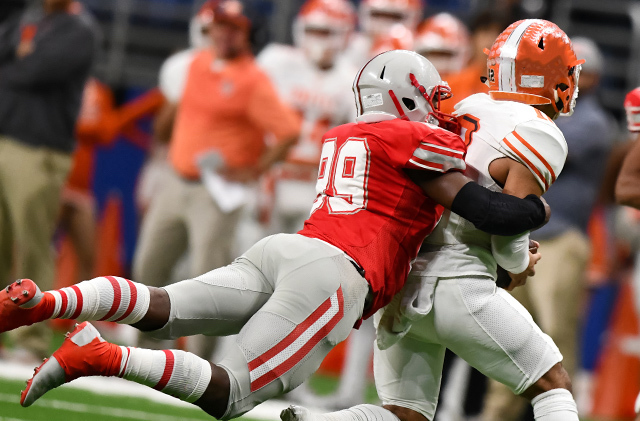5 Common Football Injuries That Sideline Athletes

Football is back in season, and many out there are lacing up like their favorite athletes. However, even the most seasoned athlete encounters some common football injuries from time to time. Explore our guide to help identify some of the injuries that may occur and how a sports medicine specialist can treat them.
Hamstring Strains
Your hamstring is the muscle that runs from the top of your leg to the back of your knees and helps propel you forward when you run. When this muscle tears or stretches too far, it can cause sudden and sharp pain in the back of your thigh. You’ll likely feel the most pain when running, lifting your leg high, or when you stretch.
If you’re experiencing symptoms of a hamstring strain, avoid putting weight on your leg. Make sure to get plenty of rest while keeping your leg elevated. Icing your hamstring two to three times a day for 30 minutes will help alleviate the swelling. You can also wrap your leg in an elastic bandage to reduce the swelling. For pain relief, stick to pain relievers like Ibuprofen, which is recommended for muscle injuries.
Ankle Sprains
Ankle sprains are one of the most common injuries in sports – and an especially common football injury. An ankle sprain can occur anytime you roll your ankle, or it bends beyond its range of motion. This often happens when you bring your foot to the ground at a bad angle, forcing it to twist.
There are two types of sprains: simple and high sprains. A simple sprain will often heal with rest and icing the ankle two to three times a day. A high ankle sprain is more severe, and it's recommended you see a sports medicine specialist to administer treatment or fit you for a brace or boot.
Achilles Tendinitis
Achilles tendinitis is named after the famous Greek war hero, but it affects many athletes as well! This injury is a swelling of the Achilles tendon, which connects your heel to your calf. These types of injuries are often caused when you jump on the field without adequate stretching. However, some people are prone to Achilles tendonitis, namely those with flat feet, where the entire sole touches the ground. The pain caused by Achilles tendonitis is often mild to moderate and will subside with rest.
An Achilles tear is a far more severe injury, and you’ll want to seek a professional sports medicine specialist for treatment. The pain you experience during a tear will be more severe and acute. You’ll also have a tough time putting weight on your foot. A professional orthopedic doctor will be able to determine how severe your tear is and the best way to get you back on your feet.
Meniscus Tears
Between your thigh and shin bones is a layer of cartilage, called the menisci, that helps cushion and stabilize the knee. A meniscus tear is when any of the menisci rip due to acute trauma or degeneration over time.
Since football includes a lot of pivoting and twisting to avoid tackles, meniscus tears tend to be common. Many players who experience meniscus tears report hearing or feeling a pop in their knee while active. Symptoms include pain, stiffness, and the inability to extend your knee to a full range of motion.
If you notice any of the above symptoms, stop playing immediately. You should make an appointment with a qualified therapist to determine the extent of the tear. While most meniscus tears will heal with rest and plenty of icing, some more severe injuries may require surgery.
Anterior Cruciate Ligament (ACL) Injuries
Finally, injuries to the anterior cruciate ligament, commonly called the ACL, are among the most common football injuries. High impact sports, like football, are where we see these injuries the most, and they can vary in severity. Injuries are graded on a scale of one to three:
- A Grade 1 Sprain is when the ligament slightly stretches but is otherwise able to support the knee.
- A Grade 2 Sprain is when the ligament becomes loose. This is often called a partial tear.
- A Grade 3 Sprain is the most severe and occurs when the ligament completely separates (This is what most sports fans mean when they talk about an ACL tear).
In minor cases, ACL injuries can be treated without surgery. However, ACL tears (especially Grade 3 tears) require surgery to repair, often requiring full reconstruction. If you suspect you may have injured your ACL, seek professional treatment immediately.
Are you experiencing symptoms that you suspect may stem from one of the common football injuries mentioned? NY Orthopedics has multiple locations across New York and an office in New Jersey. Schedule an appointment today!
